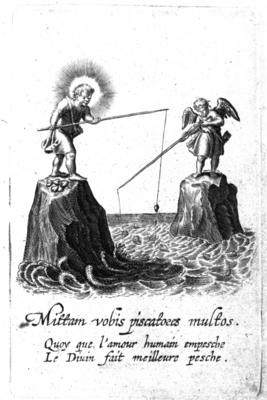Piscatio Amoris [6]

VI.
Barrad.
Luc.5.
Ambros.
Ambros.
PEriculosum mare, mundus est, ac procellosum,
in eo pleraqueue corda hominum, veluti pisces,
voluptatibus, diuitijs, sceleribusqueue immersa na-
tant, vnde ab hoc piscatore diuino in lucem gra-
tiæ fœliciter extrahūtur. Laxet igitur retia sua in
capturam Amor diuinus: sed quænam sunt, quæ
laxari iubentur, retia, nisi verborum complexio-
nes, & quasi quidam orationis sinus, & disputa-
tionum recessus, qui, eos quos cœpit, non amit-
tit? & bene hæc amorosa instrumenta piscandi,
quasi retia sunt, quæ non captos perimunt sed re-
seruant; & de profundo ad lumen extrahunt, &
fluctuantes de infernis ad superna perducunt.
Amor mundanus laxat etiam sua retiacula
prædicationis, quibus corda hominum conatur
expiscari; non vt capta reseruet sed vt perimat.
PEriculosum mare, mundus est, ac procellosum,
in eo pleraqueue corda hominum, veluti pisces,
voluptatibus, diuitijs, sceleribusqueue immersa na-
tant, vnde ab hoc piscatore diuino in lucem gra-
tiæ fœliciter extrahūtur. Laxet igitur retia sua in
capturam Amor diuinus: sed quænam sunt, quæ
laxari iubentur, retia, nisi verborum complexio-
nes, & quasi quidam orationis sinus, & disputa-
tionum recessus, qui, eos quos cœpit, non amit-
tit? & bene hæc amorosa instrumenta piscandi,
quasi retia sunt, quæ non captos perimunt sed re-
seruant; & de profundo ad lumen extrahunt, &
fluctuantes de infernis ad superna perducunt.
Amor mundanus laxat etiam sua retiacula
prædicationis, quibus corda hominum conatur
expiscari; non vt capta reseruet sed vt perimat.

Pesche de l'Amour.
VI.
Petits pescheurs que ie veois à l'enuie
Pescher touts deux, dites moy, ie vous prie,
Qu' el est l'appas pour prendre ces poissons?
Le seul amour en est l'vnique amorce,
Qui les inuite d'vne douce force,
A s'engager dedans nos hameçons.
VI.
Petits pescheurs que ie veois à l'enuie
Pescher touts deux, dites moy, ie vous prie,
Qu' el est l'appas pour prendre ces poissons?
Le seul amour en est l'vnique amorce,
Qui les inuite d'vne douce force,
A s'engager dedans nos hameçons.
Translations
 |
Fishing of love1. |
 |
I will send for you many fishermen2. |
Literature
Sources and parallels
-
Possibly based on, not mirrored: Piscatio amoris. [1] (in: anonymous, Amoris divini et humani antipathia (1628))
[Compare
![Compare [compare]](/static/images/compare2.gif) ]
]
-
Parallel for the pictura (exact copy), the Latin bible quote and the French epigram in:Ik zal u Vissers der Menschen maken [22] (in: Jan van Hoogstraten, Zegepraal der goddelyke liefde (1709))
[Compare
![Compare [compare]](/static/images/compare2.gif) ]
]
References, across this site, to this page:
- Piscatio amoris. [1] (in: anonymous, Amoris divini et humani antipathia (1628))
- Ik zal u Vissers der Menschen maken [22] (in: Jan van Hoogstraten, Zegepraal der goddelyke liefde (1709))
Iconclass
Human and sacred love are standing on a rock in the sea, both holding a fishing-rod; sacred love, unlike human love not blindfolded, uses hearts for bait- God's perfections
[11A23]

- radiance emanating from persons or things
[22C31]

- island (+ variant)
[25H14(+0)]

- sea (seascape)
[25H23]

- heart
[31A2221]

- blindfold
[31A3191]

- heavenly love versus earthly love
[33C82]

- Love personified
[33C91]

- fishing (sports) (+ fishing-rod)
[43C12(+4161)]

- angling
[43C121]

- quiver
[45C23]

- Strength, Power; 'Fortezza', 'Fortezza d'Animo e di corpo', 'Fortezza del corpo congiunta con la generosité dell'animo', 'Fortezza
& valore del corpo congiunto con la prudenza & virtù del animo', 'Forza' (Ripa) (+ emblematical representation of concept)
[54A7(+4)]

- (personifications and symbolic representations of) Love; 'Amore (secondo Seneca)' (Ripa) (+ clothed with wings)
[56F2(+1331)]

- (personifications and symbolic representations of) Love; 'Amore (secondo Seneca)' (Ripa) (+ emblematical representation of
concept)
[56F2(+4)]

- proverbs, sayings, etc. (with TEXT)
[86(PISCATIO AMORIS)]

Comments
commentaryNotes
"Fishing of love", as the frase is ambiguous. It can be interpreted as "what the fisher does" and "what is done to the object
of the fishing".
Barrad.: most likely Sebastanus Barradius or Barradas (1542-1615), a Jesuit, who wrote a commentary on the Gospels. The placement of the marginalia makes the reading rather difficult: it is also possible that the references are to Barradius's or Ambrose's commentaries on Luc. 5.
Barrad.: most likely Sebastanus Barradius or Barradas (1542-1615), a Jesuit, who wrote a commentary on the Gospels. The placement of the marginalia makes the reading rather difficult: it is also possible that the references are to Barradius's or Ambrose's commentaries on Luc. 5.
"I will send for you many fishermen" (KJV): loosely quoting Jer. 16:16; "I am now sending for many fishermen" (NRSV): loosely
quoting Jer. 16:16
![[H O M E : Emblem Project Utrecht]](/static/images/rd-small.gif)




































































































